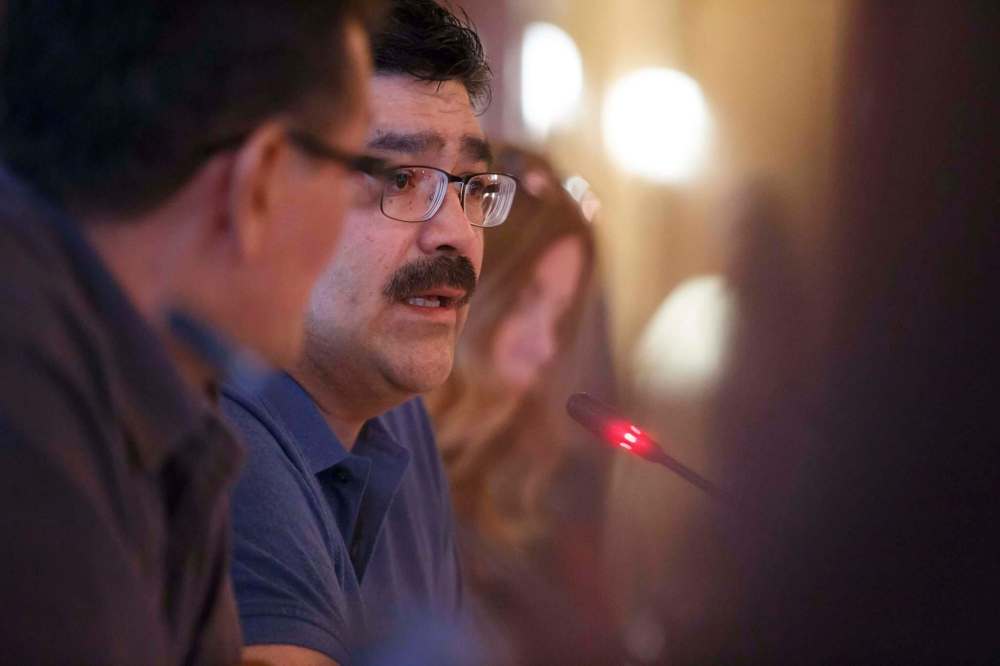Elder says First Nations should have right to block projects
Advertisement
Read this article for free:
or
Already have an account? Log in here »
To continue reading, please subscribe:
Monthly Digital Subscription
$1 per week for 24 weeks*
- Enjoy unlimited reading on winnipegfreepress.com
- Read the E-Edition, our digital replica newspaper
- Access News Break, our award-winning app
- Play interactive puzzles
*Billed as $4 plus GST every four weeks. Offer only available to new and qualified returning subscribers. Cancel any time.
Read unlimited articles for free today:
or
Already have an account? Log in here »
Hey there, time traveller!
This article was published 12/04/2019 (2152 days ago), so information in it may no longer be current.
A Senate committee has been told Indigenous communities should have the ability to block energy projects that would cause too much damage to their land.
Speaking to a panel of senators, who are conducting hearings into Bill C-69, in Winnipeg Friday, Swan Lake First Nation elder David Scott asked, “Where is our ability to say no? … We must consider the impacts of industry on the lives of Indian people.”
He appeared alongside Leslie Dysart, a member of South Indian Lake First Nation, and University of Manitoba environmental science Prof. Stephane McLachlan. All three asked for more Indigenous input during the regulatory process of hydro projects.

Dysart called for greater federal oversight of such projects.
“I live every second of my life under the oppression, devastation and harmful practices of Manitoba Hydro that they are proposing to continue into the future permanently. Canada is absent from these processes,” Dysart said.
“Manitoba Hydro is flooding our lake, decimated our lands, forced our relocation, allowed the burning and destruction of our traditional homes and continues to impact us… destroying a fish population and our economy, all under the approval and so-called regulation of Manitoba.”
Bill C-69 would repeal the Canadian Environmental Assessment Act and retire the National Energy Board. The Impact Assessment Agency of Canada and the Canadian Energy Regulator would become the authorities responsible for assessing the environmental, health, social and economic effects of proposed energy projects. Senators on the energy, environment and natural resources committee are conducting cross-country hearings into the bill.
Hydro lawyers Grainne Grande and Jennifer Moroz asked the committee to consider making the regulations flexible, depending on the scale and complexity of energy projects. They also want firm deadlines for permits to be approved.
Hydro is currently waiting for federal approval of the proposed Manitoba-Minnesota transmission line. A decision is expected by May 16.
“It is critical that all parties have certainty of process and timelines and that the process is proportional to the complexity of a project,” Grande said.
“Simple modifications like those that come with no additional land acquisition or changes to voltage to existing projects would not be put through the same complexity of process as constructing a new line,” she suggested.
At one point, Hydro officials were surrounded by about a dozen activists who carried signs with slogans decrying the oil industry and calling for climate justice. They briefly interrupted testimony before being escorted out of the conference room at the Fort Garry Hotel.
A spokesperson said it was the first time protesters made it inside one of the committee’s hearings. Hundreds of pro-oil supporters gathered outside its hearings in Alberta. The committee has already been to Vancouver, Calgary, Fort McMurray, Alta., and Saskatoon. More hearings are lined up for Eastern Canada.
There was debate about whether the committee should come to Winnipeg. Alberta Sen. Paula Simons, who had suggested last month the committee needn’t travel to Winnipeg, said Friday she is glad it did. She noted the testimony on Friday morning was quite different from what was said in other cities.
“So it was very eye-opening. Sen. (Mary Jane) McCallum, who is my colleague on this committee, has spoken about this before,” she said, referring to the effect of Manitoba Hydro projects on Indigenous communities.
“But to hear it right from the people most directly affected, it was a very powerful presentation. And it stood in real contrast to some of what we’ve heard from Indigenous community leaders in Alberta and Saskatchewan, who are actually speaking out to say that they need the resource industry because it provides wealth and sustainability to their communities.”
Simons said she shared Manitoba Hydro’s concerns about transmission lines being an essential part of national infrastructure.
“But it’s absolutely true that we can’t just think that hydro is the magical answer to our energy needs without giving consideration to the communities that are most directly affected by those developments,” she said.
Representatives from Amnesty International were scheduled to speak to senators later Friday afternoon. Women’s rights campaigner Jackie Hansen said Thursday they would be discussing why Bill C-69 should include recommendations for gender-based analysis of energy projects, so as to consider their effects on women and girls.
– With files from The Canadian Press
jessica.botelho@freepress.mb.ca
Twitter: @_jessbu


